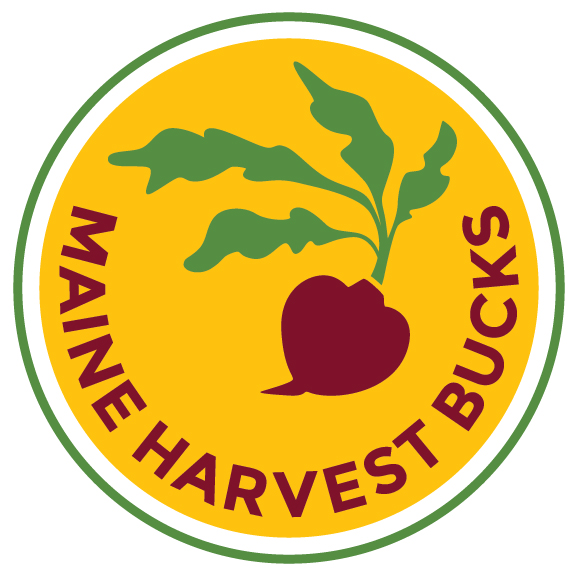 |
By Heather Omand
In 2015 MOFGA, as one partner in the Maine Local Food Access Network (MLFAN), embarked on a collaborative initiative to increase access in Maine to local, healthy foods. The MLFAN developed Maine Harvest Bucks (MHB), a nutrition incentive to low-income consumers that is available at farmers’ markets, farm stands, community supported agriculture (CSA) farms and natural food stores selling local produce. With MHB, shoppers using Supplemental Nutrition Access Program benefits (SNAP, formerly called food stamps) gain access to healthy, local food and receive bonus local fresh produce, stretching limited benefits much further. Increasing the number of consumers who buy local food contributes to the growth of our local economy, creates community connections and facilitates healthy eating!
MOFGA has managed the CSA component of MHB by working primarily with certified organic CSA farms to reduce share prices by 50 percent or more. Consumers with SNAP pay half the normal share price, but the farmer still receives the full value thanks to grant funding made possible by the MLFAN, Maine Farmland Trust, Wholesome Wave and USDA.
In the 2015 season, the first year of the grant, the six participating CSA farms served over 75 low-income individuals and families in Maine for a total of more than $17,000 in incentives distributed. Most participating farmers had prior experience working with either MOFGA or other local nonprofits in offering food access initiatives.
The 2016 summer CSA share season brought exciting opportunities and new challenges to the second year of the three-year grant. Not all of the farmers who participated in 2015 returned, but eight new farms came on board for a new total of 11 CSA farms participating in the MHB program. So far, over 80 low-income individuals and families have benefited from the program, with another 30 expected to benefit over the winter. (One participating farm’s biggest CSA season is November through February.) Of the 10 farms participating in the summer of 2016, three have seen low-income shareholders drop out partway through the season due to a reduction in their SNAP benefits, and seven farms were unable to fill the full number of reduced price shares they had available. Some of these challenges are due to the nature of offering MHB in new venues and include the need for education about the CSA model and the time needed to get the word out. However, we know anecdotally that at least some of these challenges are due to changes in the SNAP program.
The number of Maine people enrolled in SNAP decreased by more than 31,000 (14 percent) from September 2014 to September 2016. We can hope that this is due partly to former participants’ improved circumstances, but we know that important policy changes also occurred in Maine within that timeframe. In 2015, the LePage administration added an asset test for childless adults to the requirements for SNAP eligibility, making people ineligible if they have more than $5,000 in cash or property, including savings accounts, snowmobiles, boats, motorcycles, ATVs or other valuables. This affected about 8,600 SNAP recipients. Aroostook County alone, where a snowmobile can be a key mode of winter transportation, saw a 6.2 percent reduction in the amount of SNAP benefits distributed from March 2015 to March 2016.
In early 2016, a second LePage initiative affected SNAP eligibility requirements. Over 12,000 childless, unemployed adults lost their SNAP benefits in March due to a change demanding that these individuals either work part time, participate in state job training programs or volunteer for a certain number of hours per week – regardless of transportation issues, the availability of such training programs in their region, or the fact that multiple counties in Maine were considered “labor surplus” areas at the time (areas with a significant imbalance between the availability of jobs and the number of people willing to work).
While it is impossible to prove that changes in SNAP program regulations affected MHB participation at CSA farms, they likely contributed. United States Department of Agriculture Secretary Tim Vilsack has criticized LePage directly for his changes to Maine SNAP eligibility requirements, while Vilsack has also attributed the lowest figures on national record for food insecurity among children to the efficacy of the SNAP program. In 2015 and 2016, several studies concluded that the long-term impacts of SNAP are crucial to a strong safety net that not only “reduces poverty in the immediate term, it also reduces the number of people who need that safety net over the long term,” according to economist Sandra Black, Ph.D.
According to the Maine Federation of Farmers’ Markets (an MLFAN partner), those studies found that children who benefit from SNAP in utero and early childhood are 16 percent less likely to be obese as adults and 18 percent more likely to graduate from high school; that SNAP lifted 4.7 million people, including over 2 million children, out of poverty in a single year; that SNAP access during childhood was directly linked in one study to increased economic self-sufficiency in adulthood, especially among women; and that in more than 80 percent of SNAP recipient households with at least one working-age, non-disabled adult, someone worked in the year immediately before or after receiving SNAP benefits.
MOFGA is excited to continue participating in the MHB program and facilitating its availability at Maine CSA farms. We believe in investing in Maine people and increasing access to healthy, organic food in a way that benefits farm viability. If you have questions about the program, please contact me.
Heather Omand is MOFGA’s organic marketing and business coordinator. You can contact her at 207-568-4142 or [email protected]
